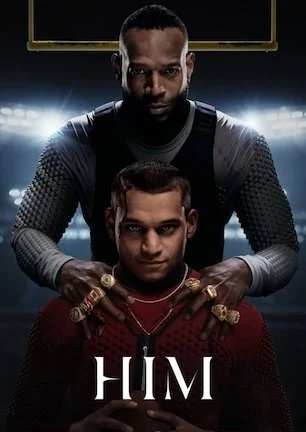Studio: Netflix/Blumhouse
Director: John Lee Hancock
Writer: John Lee Hancock
Producer: Ryan Murphy, Jason Blum, Carla Hacken
Stars: Donald Sutherland, Jaeden Martell, Joe Tippett, Kirby Howell-Baptiste, Cyrus Arnold, Colin O’Brien, Thomas Francis Murphy, Peggy J. Scott
Review Score:
Summary:
Having been buried with his cellphone, a dead billionaire seemingly remains supernaturally connected to an idealistic boy he befriended.
Review:
Adapted from the novella in his “If It Bleeds” collection, Netflix’s “Mr. Harrigan’s Phone” both is and isn’t what many might popularly expect from a Stephen King story. Because nothing supernatural or “scary” happens for nearly the entire first half of the runtime, the movie doesn’t exactly tread in traditional King terror-tory. At the same time, “Mr. Harrigan’s Phone” still molds mood out of quite a few typical King tropes, from a budding young writer growing up in a small Maine town to an assortment of high school stooges like a comic book-reading goof-off and an overbearingly oafish bully.
In 2003, Craig takes a job, the kind kids often get from elderly neighbors or family friends, reading classic literature to Mr. Harrigan three times a week. Craig is an idealistic young boy still mourning his mother’s death, otherwise undergoing an ordinary childhood of corner stores and classmate crushes under the caring eye of his grieving father. Harrigan is a reclusive billionaire with failing eyesight, whose callous prioritization of business over people assured him a lonely life in a museum-like mansion.
Craig and Harrigan are characters that can be summarized in single sentences, but the performances put far more complexity into their personalities. By the time the boy matures into a teenager after five years of regular readings with Mister Harrigan, Jaeden Martell takes over the role and continues evolving Craig into a kind, smart, thoughtful person. You wouldn’t want to put an “-ly” adjective in front of any of those traits. There’s a casual quality to Craig that endears him as a relatable “Everykid,” someone whom anyone can see some element of themselves reflected in. Rather than being defined too distinctly, Craig serves as a malleable vessel for absorbing audience sympathies on his heartbreaking journey of self-discovery.
Harrigan inherits the appealing charm and commanding presence that comes naturally from being played by Donald Sutherland. It’s a savvy strategy for creating a character simply. Start with the stereotypical skeleton of a cutthroat entrepreneur, a cantankerous Rupert Murdoch type you’d expect to see menacing minority housekeepers with sadistic verbal abuse. Then coat him in the unexpected warmth of Sutherland’s grandfatherly gravitas. Harrigan doesn’t demand that the actor do much more than sit, reacting to Craig’s readings or instigating mildly combative conversations on his own. Sutherland’s almost regal steeliness suits Harrigan perfectly, providing a sense of sternness, perhaps even insidiousness, that concurrently wars with an inviting aura that manages to both challenge and inspire Craig.
Theirs is an unusual bond to be sure, and writer/director John Lee Hancock ensures that their unlikely friendship anchors the movie’s emotional moments while remaining balanced fairly. It’s not a spoiler to reveal that Harrigan dies. His demise and subsequent continued connection to Craig via a seemingly supernatural cellphone are central points to the plot. Of course Harrigan’s fondness for Craig means he’ll be financially provided for in the will, but it’s not a monumental windfall like one might expect to see in an exaggerated movie universe. It’s an appropriate fraction of cash, indicative of how Harrigan appreciates Craig without truly treating him like the adored son he never had. Their link is realistically respectful without being cloying, and that’s due to how effortlessly Martell and Sutherland present the duo as authentic people we can connect with and feel for.
The problem this poses is that every other side player becomes background noise as “Mr. Harrigan’s Phone” moves on. A groundskeeper, a college roommate, and a girl with unrequited romantic affection for Craig are just three of the throwaway inclusions that don’t even facilitate any necessary narrative beats. Not that they have to. The bond between Craig and Harrigan is what matters most to the movie, though it comes at the expense of attempting to expand a short story with filler fit for a Deleted Scenes section on home video.
Since “spookiness” doesn’t enter the picture until the movie’s midpoint, those with heavy eyelids will have the hardest time hearing the questions “Mr. Harrigan’s Phone” poses. This is a sentimental Stephen King story about death, grieving, and guilty consciences that’s closer in tone to “Stand by Me” than “Pet Sematary.” Some may be disappointed to discover that the movie delivers a drama determined to stick with you, just not in the haunting way that King’s frightful fables often do. Instead, “Mr. Harrigan’s Phone” hits invested heads and hearts in a reflective manner that prompts intrapersonal examinations of coping, culpability, and coming to terms with the consequences of damaging actions.
Review Score: 75






More of a ”side of the road” stop than destination entertainment, “Shelby Oaks” would fit well in a faux documentary marathon, just not as the main draw.